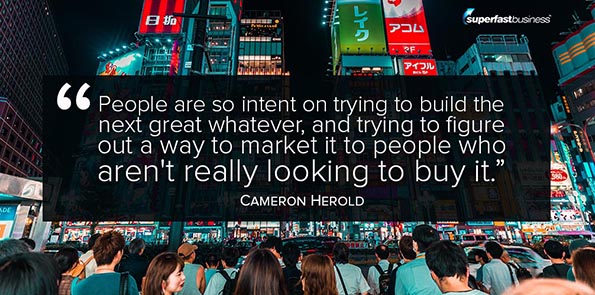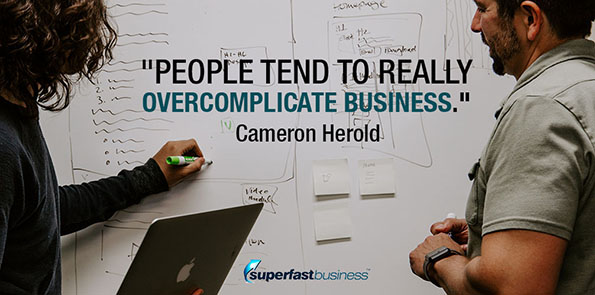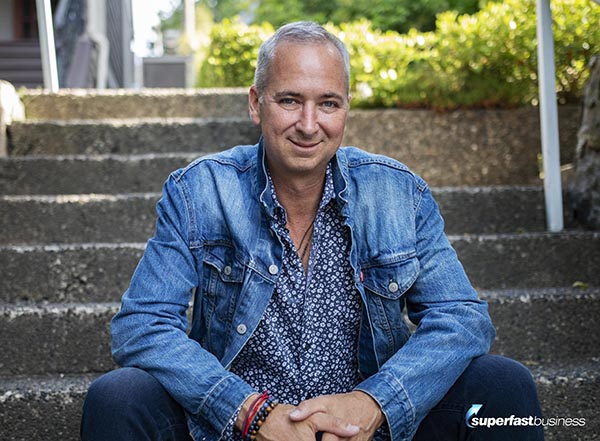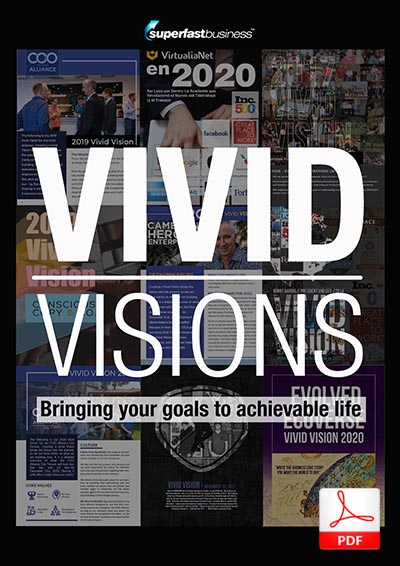Podcast: Download (Duration: 36:29 — 33.5MB)
Get Notified Of Future Episodes Apple Podcasts | Spotify | Amazon Music | Android | Blubrry | Gaana | TuneIn | Deezer | Anghami | RSS | More
Episode highlights:
01:51 – Business and pleasure
02:44 – An early start in business
06:45 – When entrepreneurship became cool
08:10 – School struggles and what’s happened since
10:08 – Keeping an eye on innovation
12:35 – Double your revenue, double your profit
16:45 – Visualize and perform
18:58 – Miracle mornings for business people
22:08 – The real reason meetings suck
23:25 – How to get free PR
27:16 – What Cameron sells these days
31:17 – Letting seconds-in-command tell the story
33:01 – The counterintuitive way to get an advantage
Build and achieve your business vision with help from James
Transcription:
James: James Schramko here. Welcome back to SuperFastBusiness.com. This is Episode 702. We’re going to be talking about your vision for your business and scaling your business and perhaps how you can pass on some of your business ideas to your kids. And for that, I’ve brought along the CEO whisperer himself, Cameron Herold. Welcome.
Cameron: Hey, James, thanks for having me. I appreciate it.
James: Well, it took some organizing through some mutual contacts. But I’m really glad we got to make it happen, because you’ve got such a wealth of experience. And I know you’re pretty hardcore when it comes to your time distribution; you’ve got a strong grasp of the 80/20. You’ve put firm boundaries in place with your personal life. In fact, in one of your books, Double Double, you have a chapter on the topic of work-life balance, which was great to see there. It’s sort of the core of what I’ve been doing over here with Work Less Make More. But we have so many things in common. And then you’ve got such a vast amount of experience. So I’m sure we’re going to have a great discussion today.
Cameron: Thank you. Yeah, you threaded the needle. This will be the first time I’ve slept in my own bed since October 21. So it’s been about, I guess, it doesn’t matter. It’s going to be two and a half weeks since I slept in my own bed.
Business and pleasure
James: Oh, wow. Well, you know, I just flew back from the Philippines yesterday morning. So I mean, I’ve spent one night in my bed here. But it was good. I went over to Florida to speak at an event – a friend of mine, Kevin Rogers, runs Copy Chief Live. And then I went for a week surfing with a business partner of mine up in a regional part of the Philippines, which was good. Do you blend corporate trips and personal vacations?
Cameron: Yeah, I do, actually. I was just over in Europe for my birthday trip, and I hung out with a couple of my coaching clients over there. We went to a music festival. And this summer I was back in Europe, and I went for dinner with one of my coaching clients. I went for dinner in Switzerland, went for dinner in Italy with another one of my coaching clients, and went for lunch with a third in Austria. So, yeah, I try to tie in something with my clients or just doing stuff for fun with them as well.
James: Yeah, that’s really nice. And also, it’s probably a good tax deduction.
An early start in business
So you started off with your entrepreneurial journey quite early; you had it in the family DNA. And then you had a painting business, a house-painting business when you were quite young, which I thought was really interesting, because I had a lawn-mowing business when I was young, and I thought that, you know, it’s a market that doesn’t really go away, isn’t it? People’s houses are going to get flaky paint and lawns are going to continue to grow. Do you think that was part of the secret, was finding a market that is evergreen?
Cameron: I’m not sure if it was part of the secret for me, other than, I think I had about 16 or 17 different little operational businesses as a kid and those were all the typical ones that you kind of did, right? You cut lawns, you delivered newspapers, you sold things door to door, you bought stuff low and sold it high. I just did all kinds of little entrepreneurial ventures. And my father really groomed the three kids to be very entrepreneurial. And so I guess with him doing that, we were always kind of latching on to any ideas that we could do to make money and have fun. And then he really reinforced the lessons. So anything that we did, he would try to help us think about the learning that we kind of got from it. So it wasn’t just cutting grass, it was, you know, that we understood recurring revenue or that we understood how to estimate, or we understood how to coordinate production so that you did everybody on the same street in the same day. So it wasn’t just cutting a lawn, it was always there were lessons with that. And then every single one of my business ventures that I did before I was 18, I can think back to very specific strategic lessons that I probably still carry with me today.
James: I learned a lot of lessons like that, too. One of the ones I remember with the lawn mowing one was, yes, it’s good to have them all in the same place at the same time. But I also got wiped out at one point when a developer bought the whole block and knocked it down to put a retirement home. So I lost a huge chunk of my portfolio on one hit. So I learned about single-source dependency.
Cameron: Yeah.
James: I also learned that the pricing didn’t really relate that much to you know, it wasn’t like a cost-plus pricing model. Some people with a tiny lawn would pay the most and some people with a big lawn would pay the least. So it was more relationship of how they thought about money and how motivated they were to not have to mow the lawn, and which area they were in and what car they drove were all clues for me as to the pricing. So, valuable lessons.
“Those lessons that we kind of pick up are ones that we carry with us today.”
Cameron: And those are all really interesting lessons to carry with us, right? Because I guess all of those lessons that we kind of pick up are ones that we carry with us today.
James: Oh, absolutely. Like, you go out to the car and it won’t start, but you’ve got lawns to mow and you have to deliver. So yeah, it’s like, okay, we need the contingency planning now. How am I going to get transportation? And these obstacles happen to us when we’re young, and then they keep happening in business. But once you recognize the pattern, you celebrate it. It’s like, I know this one. I know this trick. And they keep repeating.
It’s great that you got some help from your parents. I think I probably had more conventional parents. And I had to get a lot of entrepreneurial inputs from my grandparents, and as it turns out, my great grandfather, whose journals I found. And I’ve rediscovered how entrepreneurial he was, doing arbitrage between the USSR and the United States and traveling around the world and opening up gold and silver mines. I didn’t know about this until later on in life.
It’s really interesting how you’ve even done a TED talk, talking about how you want to train your own kids. Have you made good progress there?
Cameron: Well, it’s funny, because that TED talk was actually how I was raised. It wasn’t how I was raising my kids. It was really, you know, raising entrepreneurial kids. It was really the lessons of how I was raised as a child and the lessons that I got from all of it, versus how I was trying to do it with my children. And I think in a lot of ways, because my lessons were from an era, a lot of the little businesses that I did wouldn’t transfer today, right?
James: I wonder if they would or not. I mean, one thing I’ve noticed with my own kids is the shift in technology, where it’s a really slippery slope. I’ve really encouraged my kids to be hands-on and, and into the technology and they kind of mirroring what I did. But I’ve definitely seen it go too far. And one of my kids is like, where he’s very interested in technology, and it’s become a real challenge for us.
When entrepreneurship became cool
Cameron: Well, one thing that’s interesting now, as well, with all this stuff, is that entrepreneurship is cool. You know, when I grew up, entrepreneurship was not cool at all. It was vilified. You were looked at as being greedy and capitalist and materialistic, and even within our family. We had people in our family that thought, because they were the entrepreneur side of the family, thought it was pretty cool. We had other people in our family that thought I was some greedy little kid and didn’t really understand why I was so focused on doing it all the time. Whereas nowadays, if you saw some kid being entrepreneurial, you’d be like, oh, there’s the next Mark Zuckerberg. Well, that really wasn’t the kind of way I grew up.
“One thing that’s interesting now is that entrepreneurship is cool.”
James: Yeah, I guess you’ve seen the rise of Apple and Microsoft and Facebook. Well, I guess we’re yet to see if being Mark Zuckerberg is a good thing or bad thing in a few years from now. It seems to be shifting slightly.
Cameron: The rise of entrepreneurship really happened from ‘98 to 2000. So it’s 20 years ago, that’s when the first rise of entrepreneurship being cool happened; it was at the rise of the first .com era. So, you know, I think anyone who may be as 30 to 35 probably saw entrepreneurship as being cool. Anyone younger than that certainly did. But if you’re 40 plus, 45 plus, anyone who had the entrepreneurial traits were typically told to be lawyers because we could negotiate, we hustled, we worked hard. We could sell, we were strong leaders. Those were all traits that people thought would be a good lawyer. I just didn’t want to be a lawyer. I wanted to be an entrepreneur.
School struggles and what’s happened since
James: I like to argue, and I did love my law subjects when I was doing some accounting studies, but I didn’t have the grades to get into university after school. Unfortunately, I didn’t pass my school. I think you had some struggles at school as well. You were talking about how you were good at speaking, but they were forcing you to study subjects you weren’t that good at or interested in.
“For the vast majority of the kids, school is very detrimental because it’s telling them constantly that they’re stupid.”
Cameron: Yeah, I was always told to sit still and pay attention and be like everybody else and stop being so disruptive. And I was getting in trouble for selling stuff at school all the time. And I just wanted to be an entrepreneur, and I really wasn’t allowed to follow that path. And so I struggled in school, for sure. I got 63 percent in high school. I got about the same at a very average university. I didn’t get great grades at university. But I was running a company in university. I was on the university ski team. I started a fraternity in university. I had 12 full-time employees when I was in second year university. So for me, I would try to get these good grades and then I was being told that I just wasn’t smart. And it used to drive me crazy. I think for a lot of kids, for the vast majority of the kids, I think school is very detrimental because it’s telling them constantly that they’re stupid, or that they’re just not as good as that top five percent, which is very destructive.
James: It is very destructive. And then it works great if you have textile mills to man, to train people to follow instructions and sit still and don’t question authority. But then years later, you’re facilitating courses at MIT, you’ve been on Oprah, you travel around the world. So life’s definitely turned out okay for someone who didn’t have great grades at one point.
Cameron: Yeah, we built a business. I built a few different companies. And then the last one that I built was called 1-800-GOT-JUNK. And we got a lot of press coverage for that. You know, we ended up being covered by Harvard at their MBA program. I think every MBA student at Harvard for about six or seven years studied in our company. So yeah, we just built a really great globally-admired brand. But it wasn’t because of formal education; it was probably because of what I used to call R&D, which stood for rip off and duplicate. We would take the good ideas or the good systems that other companies were using, and we would just put those in place.
Keeping an eye on innovation
James: It’s a recurring theme, actually. I had Jay Abraham on recently. And of course, he’s famous for cross-pollinating best practice from different industries, which is one of my favorite tricks. And I’ve also talked about before, on this show how R&D, the original version, like research and development, was the secret sauce for our search engine optimization business, while everyone else got slapped down and smacked around. We had a full-time team dedicated to innovation, which I think really goes back to the Peter Drucker innovation in marketing. And that’s really vitally important at this point in business, right? You’ve got to have an eye on innovation. And I think you also mentioned in your book that it’s okay to be using fear as a motivation.
 Cameron: Well, I think innovation is one way to look at it. But the other way is just really listen to your customers. And I think in North America, especially, I think we’ve forgotten to just go out and talk to the market and find out what they need and sell that to them. Because there’s an awful lot of businesses that you could be very, very successful at just selling what your customers want to buy. Instead, people are so intent on trying to build the next great whatever, and trying to figure out a way to market it to people who aren’t really looking to buy it. It’s a harder path than just to find out what people are buying.
Cameron: Well, I think innovation is one way to look at it. But the other way is just really listen to your customers. And I think in North America, especially, I think we’ve forgotten to just go out and talk to the market and find out what they need and sell that to them. Because there’s an awful lot of businesses that you could be very, very successful at just selling what your customers want to buy. Instead, people are so intent on trying to build the next great whatever, and trying to figure out a way to market it to people who aren’t really looking to buy it. It’s a harder path than just to find out what people are buying.
James: Yeah. And you know, having just recently visited the country, the USA that is, you know, I noticed a lot of areas for improvement. Everything from when you arrive in the country. It’s like just a woeful process compared to other countries. And I still don’t understand why they have these little tiny coins. Like, why a penny, or whatever? The amount of shrapnel I collected in a week was frightening. We don’t do little coins here anymore. We pretty much PayWay everything. Just tap the plastic. So it’s very interesting to see. Like, you only have to get on a plane and travel for 14, 20 hours, and you have a completely different market. And of course just coming back from Asia, totally different environment, again. So many things that you could just bring straight in. It’s like, why don’t they do this? Or why don’t they do that? That’s happening in another country. It’s easy to to use that geo arbitrage to have a world-class product or service.
Cameron: Yeah, it really is. I mean, I’m from Canada and I live half time in Canada and half time in the US, kind of going back and forth. And it’s even interesting, just seeing countries that are so close to each other and how different they are.
James: Well, there’s such a cultural difference between Canadians and Americans.
Okay, so let’s just do a quick rapid round. I’m really interested if you could give me a little paragraph summary of what each of your books is about, because I know my audience love to read books. We’re responsible for driving a lot of sales on Amazon these days.
Should we start with Vivid Vision?
Double your revenue, double your profit
Cameron: Sure. So, well actually, let’s start with my first book, because my first book that came out was called Double Double.
James: Okay.
Cameron: And it was really the cheat sheets for how to scale any company, how to effectively double your revenue and double your profit in three years or less. And it gave all the very, very simple systems to put in place to scale any sized company. You know, really, maybe a small to medium enterprise company. So it talked about vision and people and culture and hiring and meetings and strategy and focus. It really covered a lot of really good areas and gave enough information. It wasn’t theory. It was very specific tactical ways that people could grow their company. So that book came out 10 years ago, and it’s still doing quite well today. And then after Double Double, we moved over to the second book, which was Vivid Vision.
James: Right. I love Double Double. That is so pragmatic. It’s right up my alley. Everything you said in that book, I’m like, Yep, yep. Yep, yep. Especially what to do, how to grow when it’s slow. It’s the same advice I’ve been issuing a fair bit, the super counterintuitive, increase expenses, fire customers, find the money that’s already sitting in your business. It was solid gold. That part there is fantastic for just about anyone listening to this podcast. That was chapter 11, ironically,
 Cameron: Thank you. It’s really interesting, because I was just thinking about that chapter the other day and just kind of thinking about how applicable it is again right now. We’re kind of going into what feels like a recession. But a lot of those tools, or a lot of those systems, I think, are kind of the core basics that people forget about. People tend to really overcomplicate business. I’m not really sure why.
Cameron: Thank you. It’s really interesting, because I was just thinking about that chapter the other day and just kind of thinking about how applicable it is again right now. We’re kind of going into what feels like a recession. But a lot of those tools, or a lot of those systems, I think, are kind of the core basics that people forget about. People tend to really overcomplicate business. I’m not really sure why.
James: I think it’s human nature. And, you know, I’ve gotten good at just giving precise actions, like the minimum possible thing to do to get the big result – exactly the premise of your book, which is why I love it so much. And sometimes, you know, after you deliver that, people are like, they’re pausing. They’re like in shock that it just can’t be that simple. You couldn’t just do that thing and get a result. It is actually the case in many instances. And that’s why that chapter resonated with me the most, because it’s the most counterintuitive to what’s happening. Of course when it’s slow, people cut expenses, and they scrabble for customers. But probably one of the customers they already have is hogging up all their available resource to go and get better customers.
Cameron: Well, it’s even, like, your employees, you know? We think about, we’ve got these employees and we’ve got these negative toxic employees that are taking up all of our time. Well, fire them.
James: Yep.
Cameron: I mean, if you get rid of those negative toxic employees, and you actually spend time with your best employees, you’ll probably get a much better result. But people end up spending all the time with the wrong people instead of spending all the time with the right people.
James: Happens in sales teams, especially. If you have 10 sales people, the sales manager will spend the bulk of his time with the worst-performing sales people trying to lift them up to average, instead of just getting those eagles soaring even higher and rewarding the best salespeople. That’s a very common thing. You never say to yourself, I wish I kept that person just a little bit longer. You know, after they’re gone, it’s like, the relief and the new vibe and energy in the business.
 Cameron: Yeah, and the whole team kind of rallies around you to support you once you get rid of that negative person, too. They want the person gone. They’ll do anything to help you get rid of them. I’ve been saying for a while now that A players are the racehorses, B players are the workhorses, and C players have to go to the glue factory.
Cameron: Yeah, and the whole team kind of rallies around you to support you once you get rid of that negative person, too. They want the person gone. They’ll do anything to help you get rid of them. I’ve been saying for a while now that A players are the racehorses, B players are the workhorses, and C players have to go to the glue factory.
James: Right. And I’ve seen some really interesting research where people shift between A, B or C depending on their level of motivation. If you’re spending your time with the bad employee, it can actually bring an A player back to a B, because they’re pissed off. Like, Why is he giving that person all the attention when I’m the star performer around here? One little thing that I found really handy is when we’ve dropped a bad or a toxic employee – which is very rare now but it used to happen a lot more in the automotive industry when I was there – is we try and incentivize or reward back everyone who stayed. A little piece of their pie goes back to everyone else and they’re really happy about them leaving. It shuts down any of that back drafting, you know, the back channel and the person who left tries to call up and get all the goss and find out if the place collapsed without them. And no one will take their call.
Visualize and perform
So, okay, we’ve talked about Double Double, and then your next one was Vivid Vision, which was kind of like where you started in the first part of Double Double, isn’t it? Vision, you know, you can’t go far without that.
Cameron: Yeah. So the whole idea of the Vivid Vision is a concept that I learned about 20 years ago from a high-performance sports psychologist. He was an Olympic coach and he worked with athletes to help them visualize themselves performing their event. And he gave us the idea that if we could ever take that concept into the business world, where if we could visualize what our company looked like, but if we could share that in a way that all of our employees, all of our customers, and all our suppliers could see what the CEO could see, then everyone would be pulling in that same direction. So I codify that idea as this vivid vision document and it becomes a four or five-page written document describing your company three years in the future. And if you’d like, we can actually link a couple of examples to it in the show notes. But if people also want to send an email to to me, I can send them samples of them. We’ve got companies all over the world now are using this four or five-page document that describes their company in it’s finished state three years out, and then everyone tries to make each sentence come true over the next three years. It’s really powerful.
James: Yeah, I guess I started doing that after reading Maxwell Maltz’s Psycho Cybernetics for myself. And it’s something very important with the team. I remember when I was reading Jack, about Jack Welch. He was talking about beating the drum at the tribal meeting, often. Like he would assemble them all and share with them how things are going to work. So it’s great that you’ve captured a framework around that and and put it into the center of it. Because I guess if you can play out that vision, make it very strong, then everything’s just working to a predetermined goal. And we are, after all, goal-seeking machines.
Cameron: Well, it’s interesting. Like, people just tend to show up at a company and work hard, but if they don’t know the direction they’re going in, then any road will take them there, right? So it’s just better to give them some direction so they’re all starting to pull in that same direction together. And I think that’s really the key that the vivid vision provides, is it becomes almost a focal point so that everyone can see what the CEO can see, and then everyone can help figure out how to make that happen.
Miracle mornings for business people
James: Makes perfect sense. Yeah, if you send me an example, we’ll link it in the show notes.
I didn’t know that you co-authored The Miracle Morning, because it seems like Hal gets all the press for that one.
Cameron: No, Hal and I co-authored The Miracle Morning for Entrepreneurs, which was one of the spinoff books that he created from that. So he wrote the original Miracle Morning. And then he and I co-authored The Miracle Morning for Entrepreneurs, which is the second best seller of all the books.
James: That explains the situation. I was looking at that on Amazon earlier today. And I thought, wow, I had no idea. So it’s a spinoff book. And you know, how much of the book could overlap with the original book?
Cameron: I’d say about a third to a half of the book would overlap. You know, we include the morning SAVERS, but I have 10 different case studies from different entrepreneurs that are well-known, to include their morning success habits. I also went on to talk about the rest of the day, how to stay focused, how to leverage a vivid vision concept and how to leverage a second in command. And then I also just talked about some of the personal productivity tools that can help scale a company. So I really took my flavor of it. And then we also just talked about how some of the morning success habits spin into your company and into the spinoff that it has with your team as well.
James: What would you say is the 80/20 of the success habits? What would you say is your favorite routine?
Cameron: So if I go back to like, what the morning SAVERS are, well visualization for sure is a strong one, right? Because it ties into the vivid vision concept. I would say it would be the silence or scribing or reading; probably the reading and the scribing. So, taking time in the morning to just read, whether you’re reading The Daily Stoic, or you’re reading a book for fun, or just some element of personal growth, or even just reading for fun. I also allow myself to do audiobooks, right? I’ll lie in bed in the morning or lie on the couch in the morning and just listen to an audiobook for a half an hour. And I think just taking that content, and we don’t have to read with our eyes anymore, we do have the ability to devour contents in a different way. But that’s kind of what we mean by reading and then the scribing is just writing or journaling. So it’s just getting ideas out of your mind, whether you use something like a five-minute journal, or The Cosmic Journal or if you, just kind of, you know, blank page journal, anything like that can be really powerful.
“We have this massive amount of flexibility as to how high-performance we want to be or not.”
James: Yeah, I agree with that. I’ve been journaling for about seven years in my higher level group. And I’ve found it’s just a good way to stay accountable to yourself. Because really, we have this massive amount of flexibility as to how high-performance we want to be or not.
Do you listen to stuff when you’re running? Or do you just make that a silent time?
Cameron: I used to, but I actually cut it out. The reason I cut it out was I found that I really liked to have my silent time, my time with myself. Unfortunately, I’ve been diagnosed with osteoarthritis now in my left hip after finishing a marathon a couple years ago. And so I think my running days are probably over now. But when I hike now, I don’t listen to anything while I’m hiking. I’ve never listened to anything while I’m skiing. Certainly not when I’m cycling. So I think I just stopped listening to stuff when I was running because I really wanted to have time with myself.
James: Yeah, I concur with that. I put earplugs in when I surf so that I don’t get surfer’s ear where the bone closes over and you have to get it drilled out. But I really like the peace and quiet.
Cameron: Yeah.
James: And there’s another thing we have in common osteoarthritis. Welcome. You know, 50 percent of people over 50 have osteoarthritis.
Cameron: I’ve been told to get a hip replacement right now.
James: Great. Well, there’s a birthday present for yourself.
Cameron: There you go.
James: I hope the health care system in Canada is better than the United States.
Cameron: It is actually much better, thankfully.
The real reason meetings suck
James: Well, lucky. So you had some interesting titles, too. I’ve got Meetings Suck.
“Maybe meetings don’t suck. Maybe you suck at running meetings.”
Cameron: Yeah, the idea with Meetings Suck was people have been complaining about meetings forever, but no one actually dug in and decided how to fix them. And one of the CEOs that I was coaching – I’ve coached the company for six years – they’ve gone from 40 employees up to 700 employees; and I was talking to the CEO a couple of years ago, and he said, their meetings suck. And I said, Well, have you ever trained all of your employees on how to run them? He said, No. I said, Have you ever trained all your employees on how to show up and attend them or participate at them? He said, No. I said, Maybe meetings don’t suck. Maybe you suck at running meetings.
James: Yeah, fair call.
Cameron: And I think that’s kind of the whole point, right? If we can get them to learn how to deal with best practices, they might actually be way better off. So I wrote, a third of the book is how to run them. A third of the book is how to attend and participate in meetings. And then the third of the book is what meetings you need to run a highly successful company. So people are buying Meetings Suck for every single employee now. Whereas most business books, you might buy one or two, they’re buying it for every employee.
James: Right. So that’s a good sales approach.
Cameron: Yeah, exactly.
James: I remember, I think Chet Holmes talked about meetings in The Ultimate Selling Machine, and you talked about it in Double Double as well. It’s amazing how meetings can intrude in people’s calendar if they have no framework around them. So that’s a tremendous product.
How to get free PR
And then of course, you’re somewhat of an expert with free PR. Interestingly, in your 1-800-GOT-JUNK phase, were you the COO?
Cameron: Yeah, I was the chief operating officer. I came in as the 14th employee. And when I left, we had 3,100 employees systemwide. We ranked as the number two company in Canada to work for, and we landed 5,200 stories about our company. So you’ve probably even seen us over in Australia, because we opened up Australia when I was there as well.
James: I have seen it. And I’m also curious, you’ve got a really strong marketing side of things, but also a financial thing. And I find that’s a fairly rare combination. Usually, people are skewed one way or the other.
Cameron: Oh, I’m horrible at finance. I just hire really good finance and accounting people. That was a lesson I learned very early on, that I’m terrible at accounting. But there’s really good accountants out there. So you just have to find those people, align them and inspire them with where you’re going and get them to help you kind of create the right boundaries to make it happen. But no, I’m a terrible finance person. I’m much more operations and culture and people and marketing and PR is definitely more my sweet spot.
James: Interesting, okay. And with the PR, what would be your tips for someone who’s got a podcast, or a book, or they have a blog? It’s typical of someone listening to this podcast, actually; most of the people in this will be probably publishing some kind of video or audio content or written content on a regular basis. How can they leverage that?
Cameron: Yeah, well, first off, they should all just spend the 15 bucks and buy the book Free PR.
James: Well, that’s a given.
Cameron: It’s like a PR machine. So one of these tips, though, will be to remember that every single writer, journalist, blogger and podcaster wakes up in the morning thinking, what the heck am I going to cover today? They’re all looking for a good story. And if you approach them and say, Hey, do you have two minutes, I think I have a good story for you, most of them are going to say Yes, especially if you phone them. Because everyone else is emailing them and spamming them on social media. So if you actually get ahold of their phone number, and there’s databases that have them, pick up the phone and call the person. Chances are, they’re going to give you the two minutes to pitch them on the idea, and you’ve really broken through the clutter. And then it’s just understanding how to position your story for the outlet that’s covering you. It’s even like, you know, before we started our our discussion today I asked, Who’s your audience? so that I can just make sure that I can speak to that group of people that are going to stay, because if you go to a Fortune 500 audience versus an entrepreneurial audience versus a digital marketing group, I would speak to them very, very differently, same content, but delivered in a slightly different fashion.
James: Right. So basically creating the story for the media and phoning them up to let them know you’ve got it.
Cameron: Yeah. Now here’s the big one that we talk about in the book as well – we outline a concept called the digital trifecta. And the digital trifecta is this. It is that you have your owned media, right? Social media channels. And then you have your earned media – that’s the press coverage that you generate. And then paid media is where you can drive traffic towards it. So it’s not just about getting covered by a story. But it’s by taking that story, putting it on your website, putting it on your press page, putting it on your Facebook page, your LinkedIn profile, your Twitter profile, etc., and then buying a small amount of traffic towards it to leverage it, to kind of get it to fuel. And you kind of add a little bit of fuel to that fire. I think that’s where a lot of people think that just getting a story is going to help them scale. It doesn’t necessarily help them scale. You know even when we were on Oprah, that didn’t really help. The fact that we could talk about being on Oprah for the next 13 years, that’s what really helped us grow.
James: Right. So we have owned media, earned media and paid media. But I think that’s important. And I’ve noticed that with your own PR you take the the juicy part of the stories, and you put that back into play. So someone like me comes along, we do a podcast, and we’re talking about all the great things that you’ve done and the achievements. You’ve built a few hundred million-dollar companies; you started off nice and young.
What Cameron sells these days
I was interested in your product that you sell, was DVDs. So are they still DVDs or did you change the format?
Cameron: I actually give those away. They were DVDs for a long time. I sold them at a half million dollars’ worth of all my speaking events. Then I started selling digital versions of my speaking events so people could watch some of my old content. Now it’s all available on my website for free. People can just can just download all of that. They can watch my four main speaking events. Some of them are just older versions. And then there’s just been lots of my speaking events now have been filmed that are online as well, so people can see some of my speaking content as well.
James: So what do you actually sell these days? I saw you have a consulting program for CEOs, and you probably do paid speaking. Do you still have business interests?
Cameron: I do. I’ve got a number of companies that I’ve equity in, and then I also have a number of clients that I coach. So, the world is kind of littered with business coaches. But I coach real companies with real employees. Typically my smaller clients are around the five to $10 million range. I’ve coached companies as large as Sprint. I coached a monarchy in the Middle East. I work tech. Typically in the five to $50 million range would be where I start coaching your company and I kind of grow them to maybe 50 to 500 million. Then I have my speaking events. I’ve done paid speaking events now on 28 countries on six continents. I have my five books. And then I also started an organization called the COO Alliance, which is the only network of its kind in the world for second in commands. There’s all these groups for entrepreneurs, but there was never for the COO, never a place for the COO to go and grow.
James: Just so people can have their own Cameron.
Cameron: Yeah, exactly.
James: I can really relate to that. I used to be the general manager of the Mercedes-Benz dealership, reporting to the owner. And it’s where the load falls. I had the single-source dependent income and all the responsibility, and virtually no budget to work with, and an absent owner at times. So it was very interesting.
Cameron: That was pretty much me. Brian who is the CEO of 1-800-GOT-JUNK and myself, have a really, really strong partnership where he was you know, vision and IT and finance and I was really the operations and execution and sales and marketing. He had a really good focus on marketing and branding, really good focus on culture. We were kind of like nitroglycerin. We merged really, really well together until we got to the hundred million mark.
James: It definitely manifested in the dollars. How did that stop? Like, what was the event that changed your role in that?
Cameron: I guess after about six and a half years, I got up to 100 million and I just realized that I was not going to be the guy to get them to the billion mark. You know, the company was starting to get, you know, the head office, we had 250 people; we had operations in four countries; we were operating in 330 cities. So it had just gotten to the point that it was going to need a different leader. So I left the organization in May of 2007. They took a year to find my replacement. And they brought on the former president of Starbucks US. And she came on board for a year. And right as she came on, the recession was hitting. And she just proved to be the wrong culture fit. It sounds like, for the company, she was very corporate, and didn’t mix well. So they went through another 12-month period with an interim COO. And funny enough, they brought on a friend of mine who we’ve been friends for 30 years. We went to college together, started a fraternity together. We were both in the house painting industry together. They brought on Eric to be the new COO, and he’s been there for about seven years now, eight years now.
James: So they got the best they could get, the closest to Cameron.
Cameron: Pretty funny. And he’s a much better version for the future. I don’t think he would have been as good at all in the early days because he didn’t understand franchising. He didn’t really understand the systems to scale it. But now he’s a great one to be able to take it and replicate and scale it from there. So I think they’re about $400 million now in revenue.
James: Wow, there’s a good lesson in that, isn’t there? It’s about knowing where your sweet spot is and knowing a good time to start something and a good time to stop something. I’ve definitely seen people overcook things, stay past their use-by date, and it can go downhill rapidly and actually make it really difficult. They can have that loss of confidence.
Cameron: Yeah, exactly.
James: So what are you most excited about from here on?
Letting seconds-in-command tell the story
Cameron: Well, I’m actually focused a lot on my kids right now. One of my kids just started university, and I’m really excited for him. He’s in commerce at University of Victoria. I’m excited about my other son who’s in grade 11 and has got all these great business ideas. But I guess my focus is really growing the COO Alliance. I also have a podcast called the Second-in-Command podcast. Everyone is interviewing the entrepreneur, and I always wanted the rest of the story. So I only interview COOs of some great companies that you would know the names of. I’m interviewing the second-in-command on the Second-in-Command podcast. So I’m excited about that.
James: Yeah, I saw that, and it looks great. And I’m pleased I don’t qualify for that one. And, also, it’s such a great marketing tool for you to access deal flow for consulting. It’s a very clever strategic maneuver.
Cameron: Yeah. It’s working well on the consulting side or coaching side, it’s working well on finding members for the COO Alliance. And I’ve always really been interested in it. You know, if you asked, let’s say a husband and wife growing a family together, and if you asked the husband, you know, how did you raise your children, he would have a very true story of how he raised the family. And then if you asked the wife, how did you raise your family, she would have a very true story. But they’d be completely different. And I think about the entrepreneurial companies out there – when you ask the entrepreneur, how did you grow the company, he or she will have a true story. And then if you ask their second-in-command how they did it, it’s just a different perspective. And that’s the perspective I’d like to glean now, is what else did they do?
“If you want work-life balance, find out what women are doing, because they have it all figured out.”
James: I like that. I like you even talk about if you want work-life balance, find out what women are doing, because they have it all figured out.
Cameron: They have to, right? They don’t have the luxury or have not, over time, had the luxury to waste time. I think they’re much more efficient with their time, much more effective with their time, more effective with their relationships. I don’t think they waste as much time as men do.
The counterintuitive way to get an advantage
James: Well, Cameron, this has been a really interesting discussion; lots of good observations there. I think it’d be wonderful to end up, if we could share perhaps a tip for someone listening to this. Based on the people you’ve been consulting with and the conversations you’re having over and over again, what sort of advice would you like to impart as your super tip for a business owner who’s really looking to get an advantage over the rest of the market right now?
 Cameron: I guess the big one, it might seem a little bit counterintuitive, but you’re never going to catch up. You’re never going to get it all done. And so stop working nights, stop working weekends, stop lying to yourself and thinking that you’re going to get all this stuff done. Because you’re not. And work in more effective focus bursts. And get a life, right? Go do stuff with your friends at night, go do stuff with your family, and then go do stuff for yourself. Get a life and do the things that are going to engage you and you’re going to have fun at. And then during the day, just be very, very focused on the critical few things and delegate everything except genius. I think too many people are working, working, working, working, and it makes them boring, it makes them bored. And it doesn’t necessarily give them the highest return on their time, either.
Cameron: I guess the big one, it might seem a little bit counterintuitive, but you’re never going to catch up. You’re never going to get it all done. And so stop working nights, stop working weekends, stop lying to yourself and thinking that you’re going to get all this stuff done. Because you’re not. And work in more effective focus bursts. And get a life, right? Go do stuff with your friends at night, go do stuff with your family, and then go do stuff for yourself. Get a life and do the things that are going to engage you and you’re going to have fun at. And then during the day, just be very, very focused on the critical few things and delegate everything except genius. I think too many people are working, working, working, working, and it makes them boring, it makes them bored. And it doesn’t necessarily give them the highest return on their time, either.
James: That’s the best advice. I mean, I’m on the same page. Everyone listening to this knows what I’ll be doing after the call hangs up, because I talk about it often, but it’s time for my surf.
Cameron: Nice.
James: What I’ve found fascinating, like in the last year, I made the most profit of any year to date, but also worked the least of any year to date. I had a baby daughter as well, who’s now eight and a half months old at the time of recording this. So it’s absolutely possible to find that leverage. I think that’s such great advice. Just accept you’ll never get to it. And once you’ve let go of it, that relief comes, and then the important stuff, like the absolutely critical stuff just bubbles up anyway. Like it, it’ll find you if it’s really, really important. You’re onto that, you know? That book from 10 years ago, Double Double, you’re onto the plague of email back then. And phone usage has obviously increased significantly since then. I imagine you’ve got your own little block out rules regarding when you access things or not or who accesses it. It’s even the next stage of things. But such great advice. And I want to say how much I appreciate your generosity sharing with us today, Cameron.
Cameron: No, you’re welcome. Thank you. I think it just goes back to that lie that we tell ourselves, that we’re going to catch up. Well, you’re never really going to catch up, because even if you got your entire to-do list done, you’re going to set more goals for yourself to stretch anyway. So I think you should allow yourself maybe to work one night a month to catch up for real, and the rest of the time you just go engage in your life.
James: I ditched my to-do list a few years back. I don’t have a to-do list anymore. If I really, really need to do something, it gets put in the schedule. Like this podcast, it happens because it was in our schedule. And just freeing myself from that was such a release. So, terrific advice.
So, Cameron is available at CameronHerold.com. He’s got five books on Amazon – go and buy them all. And we’ll put a case study up of Vivid Vision framework on SuperFastBusiness.com. If you enjoyed this show, go ahead and leave a rating on iTunes. Leave a comment if you want. Let Cameron know that you heard this podcast if you bump into him on social media, or at an event where he’s speaking. And, until next time, Cameron.
Access the expertise of other thriving entrepreneurs inside JamesSchramko membership
Enjoyed the interview? Get all our episodes when you subscribe on iTunes











Double Double is one of my favorite books! So cool to hear two of my favorite authors having a conversation.